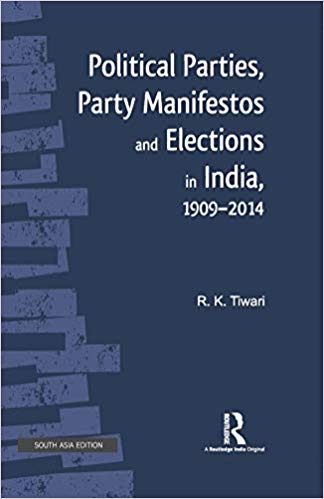There have been few academic studies that factor in election manifestos political parties frame, put out and follow once the elections are over in India. Large or small, parties frame a list of their intent, should they come to power, or share power (significant in the era of coalition politics), to be shaped as public policies to attract voters to give them their mandate. One earlier such study is by OP Sharma, ‘Economic Issues in Electoral Arena: Party Programmes and the Politics of Development’, in Ajay K Mehra (ed.), Emerging Trends in Indian Politics: The Fifteenth General Election. However, seldom, if ever, during or after the completion of their term in power, parties or governments account for the promises made in their manifestos. This study is thus among the very few that factors in party manifestos to understand political parties and elections in India. It has quite a broad time canvas of over a century.
While the Introduction and Conclusion are short, the four chapters of the book are unevenly long that make it difficult to consistently retain the focus of the discussion. ‘Evolution of Ideas on Nation Building and Economic Modernization’ summarizes the views of prominent leaders of the Independence Movement such as Raja Rammohan Roy, Dadabhai Naoroji, Mahadev Govind Ranade, Romesh Chander Dutt, Gopal Krishna Gokhale, Mahatma Gandhi, Subhash Chandra Bose and Jawaharlal Nehru. While discussing this, the author suddenly begins a discussion on the National Planning Committee, the Bombay Plan, People’s Plan, Gandhian Plan and Mahatma Gandhi’s Constructive Plan. These make the chapter uneven within, diffusing its focus, and without a context for the volume. The latter parts of the volume have no linkages with Chapter 1. Chapter 2 has another contradiction. The heading at the top says 2, but following the title of the chapter, discussion precedes another heading that says Chapter 3. Thus there are copy editing, proof reading and printing errors galore in the volume.
Such inconsistencies and errors apart, the volume presents a diligent research by the author to document and analyse the evolution of representative politics, political parties, electoral processes and the significance of party manifestos in appeals for mandate. What emerges is a fascinating history of how the process of elections evolved in India from colonial days, and the interrelation of political parties, party manifestos and elections with the help of the roots of the Indian democracy going back to colonial days. Political parties as voluntary associations and formalized organizations with dynamic institutional processes, or even a lack of these, are a significant part of democratic systems and practices across the world. Their dynamism though is not completed only with, rather it is complemented with, elections that set in motion processes of political competition amongst the contesting parties and leaders. The dynamics of political competition is further accelerated with the manifestos the parties put out to attract the voters. The study significantly highlights these with its historical analysis.

